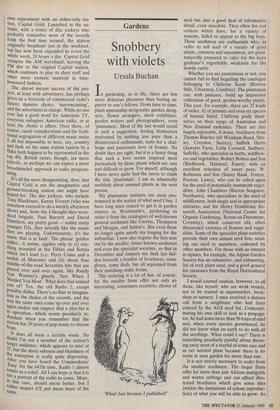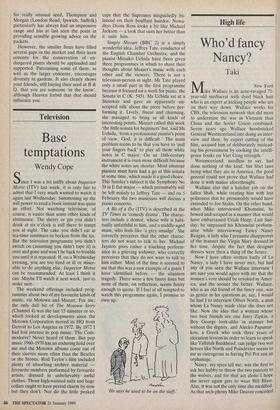Gardens
Snobbery with violets
Ursula Buchan
In gardening, as in life, there are few more delicious pleasures than feeling su- perior to one's fellows. From time to time, plant-upmanship invigorates garden desig- ners, flower arrangers, show exhibiters, garden writers and photographers, even `plantsmen'. Most of the last would recoil at such a suggestion, feeling themselves motivated by nothing less pure than a disinterested enthusiasm, taste for a chal- lenge and passionate love of beauty. No doubt they are right, but it is a funny thing that such a love seems inspired most particularly by those plants which are rare and difficult to grow. For myself, although I have never quite had the nerve to claim the title `plantsman', I am as ashamedly snobbish about unusual plants as the next person. My plantsman instincts are most pro- nounced in the matter of what seed I buy. I have long since ceased to get it in garden centres or. Woolworth's, preferring to order it from the catalogues of well-known general seedsmen like Unwins, Thompson and Morgan, and Sutton's. But even these no longer quite satisfy my longing for the unfamiliar. I now also require the lists sent out by the smaller, lesser-known seedsmen and even the specialist societies, so that in December and January my desk lies hid- den beneath a bonfire of brochures, some glossy, some drab, but all separated from their matching order forms. The ordering is a lot of fun, of course, for the smaller firms offer not only an interesting, sometimes eccentric, choice of 'What! Just because I published!' seed but also a good deal of informative detail, even anecdote. They often list real corkers which have, for a variety of reasons, failed to appeal to the big boys. These seedsmen are enthusiasts who, in order to sell seed of a variety of good plants, common and uncommon, are good- naturedly prepared to cater for the keen gardener's regrettable weakness for the dowdy rarity.
Whether you are pretentious or not, you cannot fail to find beguiling the catalogue belonging to Chilterns Seeds (Bortree Stile, Ulverston, Cumbria). The plantsman can, with patience, build up impressive collections of good, garden-worthy plants. This year, for example, there are 25 kinds of violet, 62 of primula and even six species of banana listed. Chilterns pride them- selves on their range of Australian and New Zealand endemics. There are also hugely enjoyable, if dense, brochures from Thomas Butcher (60 Wickham Road, Shir- ley, Croydon, Surrey); Suffolk Herbs (Sawyers Farm, Little Cornard, Sudbury, Suffolk), who specialise in herbs, wildflow- ers and vegetables; Robert Bolton and Son (Birdbrook, Halstead, Essex), with an excellent selection of sweet peas; W. Robinson and Son (Sunny Bank, Forton, Preston, Lancs), who can be relied upon for the seed of potentially mammoth veget- ables; John Chambers (Barton Seagrave, Northants), who specialises in the seed of wildflowers, both singly and in appropriate mixtures; and the Henry Doubleday Re- search Association (National Centre for Organic Gardening, Ryton-on-Dunsmore, Coventry), which conserves old, often threatened varieties of flowers and veget- ables. Some of the specialist plant societies provide their own annual seed lists, send- ing out seed to members, collected by other members. For those with an interest in alpines, for example, the Alpine Garden Society has an exhaustive, and exhausting, list of rock plant seed, and a good general list emanates from the Royal Horticultural Society.
I would counsel caution, however, to all those, like myself, who are weak vessels, not to be trusted in supermarket, book- shop or nursery. I once received a distress call from a neighbour who had been enticed by the AGS seed list. Underesti- mating his own skill or luck as a propaga- tor, he had sown more than 50 trays of seed and, when every species germinated, he did not know what on earth to do with all the seedlings. What could I say? There is something peculiarly painful about throw- ing away most of a trayful of some rare and as yet untried plant because there is no room in your garden for more than one.
It is not strictly necessary to order from the smaller seedsmen. The larger firms offer far more than just African marigolds and winter cabbage and can afford illus- trated brochures which give some idea (within the limitations of colour reproduc- tion) of what you will be able to grow. As for really unusual seed, Thompson and Morgan (London Road, Ipswich, Suffolk) particularly has always had an impressive range and has at last seen the point in providing sensible growing advice on the packets.
However, the smaller firms have filled several gaps in the market and their keen concern for the conservation of en- dangered plants should be applauded and supported. Patronising some of them, as well as the larger concerns, encourages diversity in gardens. It also clearly shows your friends, still buying their seed at B & Q, that you are someone 'in the know', although Heaven forbid that that should influence you.



























































 Previous page
Previous page